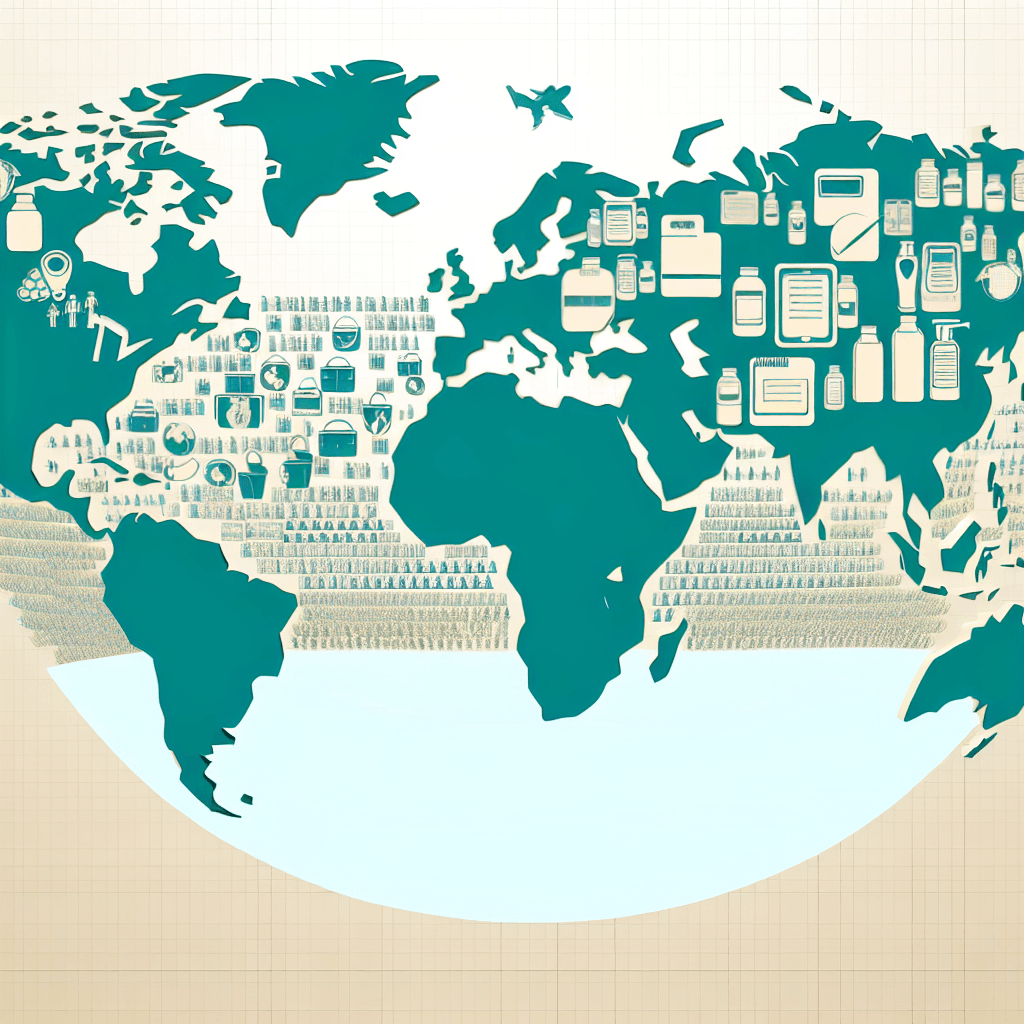Discover key trends and data on the global consumer healthcare goods market. Gain valuable insights to inform your business decisions.
Global Insights into the Consumer Healthcare Goods Market

Table of Contents
- Introduction
- The Growing Demand for Natural and Organic Consumer Healthcare Products
- The Impact of Digitalization on Consumer Healthcare Goods Market
- Emerging Trends in Personalized and Preventive Healthcare Products
- The Role of E-commerce in Driving Global Growth of Consumer Healthcare Goods
- Q&A
- Conclusion
“Uncover the trends and opportunities driving the consumer healthcare goods market with our global insights.”
Introduction
The consumer healthcare goods market is a rapidly growing industry that encompasses a wide range of products and services aimed at improving the health and well-being of individuals. With the increasing focus on self-care and preventive healthcare, the demand for consumer healthcare goods has been on the rise globally. This market includes products such as over-the-counter medications, dietary supplements, personal care products, and medical devices, among others. In this introduction, we will explore some key insights into the global consumer healthcare goods market, including its current trends, challenges, and opportunities.
The Growing Demand for Natural and Organic Consumer Healthcare Products
The consumer healthcare goods market has been experiencing a significant shift in recent years, with a growing demand for natural and organic products. This trend is not limited to a specific region or country, but rather, it is a global phenomenon. Consumers are becoming more conscious of the ingredients in their healthcare products and are seeking out natural and organic options.
One of the main reasons for this shift is the increasing awareness of the potential harmful effects of synthetic chemicals and artificial ingredients in traditional healthcare products. Consumers are now more informed and are actively seeking out products that are free from these potentially harmful substances. This has led to a rise in demand for natural and organic alternatives.
In addition to health concerns, consumers are also becoming more environmentally conscious. They are looking for products that are not only safe for their bodies but also for the planet. This has further fueled the demand for natural and organic consumer healthcare goods.
The global market for natural and organic consumer healthcare products is expected to continue its upward trend in the coming years. According to a report by Grand View Research, the market is projected to reach USD 272.6 billion by 2027, growing at a CAGR of 5.8% from 2020 to 2027. This growth can be attributed to various factors, including the increasing adoption of a healthy lifestyle, rising disposable income, and growing awareness about the benefits of natural and organic products.
One of the key drivers of this market is the growing popularity of herbal and plant-based remedies. These products have been used for centuries in traditional medicine and are now gaining mainstream acceptance. Consumers are turning to these natural alternatives for various health concerns, such as pain relief, digestive issues, and skincare. This has led to a surge in demand for herbal supplements, essential oils, and other natural remedies.
Another factor contributing to the growth of the natural and organic consumer healthcare market is the rise of e-commerce. With the increasing availability of these products online, consumers have easier access to a wide range of options. This has also made it easier for smaller, niche brands to enter the market and cater to the specific needs and preferences of consumers.
The demand for natural and organic consumer healthcare products is not limited to a particular age group or demographic. It is a trend that is being embraced by consumers of all ages, from millennials to baby boomers. This presents a significant opportunity for companies to tap into a diverse consumer base and expand their market share.
However, with the growing demand for natural and organic products, there are also challenges that companies in this market must address. One of the main challenges is the lack of regulation and standardization in the industry. With the increasing number of brands and products claiming to be natural and organic, it can be challenging for consumers to differentiate between genuine and misleading claims. This has led to calls for stricter regulations and certifications to ensure the authenticity of these products.
In conclusion, the global market for natural and organic consumer healthcare products is on the rise, driven by factors such as health concerns, environmental consciousness, and the popularity of herbal remedies. This trend is expected to continue in the coming years, presenting opportunities for companies to cater to the growing demand. However, it is crucial for companies to address challenges such as lack of regulation and standardization to maintain consumer trust and sustain the growth of this market.
The Impact of Digitalization on Consumer Healthcare Goods Market

The consumer healthcare goods market has been rapidly evolving in recent years, with the rise of digitalization playing a significant role in shaping its landscape. Digitalization, which refers to the use of digital technologies to transform business processes and create new value for customers, has had a profound impact on the way consumer healthcare goods are marketed, sold, and consumed.
One of the key ways in which digitalization has influenced the consumer healthcare goods market is through the rise of e-commerce. With the increasing popularity of online shopping, consumers are now able to purchase healthcare products from the comfort of their own homes, without having to physically visit a store. This has not only made the purchasing process more convenient for consumers, but it has also opened up new opportunities for businesses to reach a wider audience and expand their market share.
In addition to e-commerce, digitalization has also led to the emergence of direct-to-consumer (DTC) marketing in the consumer healthcare goods industry. DTC marketing refers to the practice of companies selling their products directly to consumers, bypassing traditional distribution channels such as pharmacies and retailers. This has allowed companies to have more control over their brand messaging and to build direct relationships with their customers. It has also enabled them to gather valuable data on consumer preferences and behaviors, which can be used to tailor their marketing strategies and product offerings.
Moreover, digitalization has also revolutionized the way consumer healthcare goods are advertised and promoted. With the rise of social media and other digital platforms, companies are now able to reach a larger and more targeted audience with their marketing campaigns. This has not only made it easier for businesses to connect with potential customers, but it has also made it more cost-effective compared to traditional advertising methods. Furthermore, digital marketing allows for more personalized and interactive campaigns, which can be tailored to specific demographics and consumer segments.
Another significant impact of digitalization on the consumer healthcare goods market is the rise of telemedicine and virtual healthcare services. With the advancements in technology, consumers are now able to consult with healthcare professionals remotely, through video conferencing or other digital platforms. This has not only made healthcare more accessible and convenient for consumers, but it has also opened up new opportunities for businesses to provide virtual healthcare services and expand their reach beyond traditional brick-and-mortar clinics.
Furthermore, digitalization has also led to the development of various health and wellness apps, which have become increasingly popular among consumers. These apps offer a range of services, from tracking fitness and nutrition to providing mental health support and managing chronic conditions. They have not only empowered consumers to take control of their own health and well-being, but they have also created new revenue streams for businesses in the consumer healthcare goods market.
However, with the benefits of digitalization also come challenges and concerns. One of the main concerns is the issue of data privacy and security. As more personal health information is collected and stored digitally, there is a growing need for robust data protection measures to ensure the safety and confidentiality of this sensitive data. Additionally, the rapid pace of technological advancements in the consumer healthcare goods market means that companies must constantly adapt and innovate to stay ahead of the competition.
In conclusion, digitalization has had a profound impact on the consumer healthcare goods market, transforming the way products are marketed, sold, and consumed. From e-commerce and DTC marketing to telemedicine and health apps, digitalization has opened up new opportunities for businesses and empowered consumers to take control of their health and well-being. However, it is crucial for companies to stay vigilant and address any challenges that may arise in this ever-evolving digital landscape.
Emerging Trends in Personalized and Preventive Healthcare Products
The consumer healthcare goods market has been rapidly evolving in recent years, with a growing focus on personalized and preventive healthcare products. This shift in consumer demand is driven by a number of factors, including an aging population, rising healthcare costs, and a greater emphasis on overall wellness and self-care.
One of the key emerging trends in this market is the increasing availability and use of personalized healthcare products. These products are tailored to an individual’s specific needs and health goals, taking into account factors such as age, gender, lifestyle, and genetic predispositions. This personalized approach allows for more targeted and effective treatment, as well as a more personalized experience for the consumer.
One area where personalized healthcare products are gaining traction is in the field of nutraceuticals. These are products that combine the benefits of nutrition and pharmaceuticals, and are designed to promote health and prevent disease. With the rise of genetic testing and personalized medicine, nutraceuticals are becoming more customized to an individual’s specific genetic makeup and health needs.
Another emerging trend in the consumer healthcare goods market is the focus on preventive healthcare products. These products are designed to help individuals maintain good health and prevent the onset of diseases and conditions. This shift towards prevention is driven by the increasing awareness of the importance of maintaining a healthy lifestyle and the potential cost savings of preventing diseases rather than treating them.
One example of a preventive healthcare product is wearable technology, such as fitness trackers and smartwatches. These devices not only track physical activity and sleep patterns, but also provide personalized recommendations for improving overall health and wellness. They can also monitor vital signs and alert users to potential health issues, allowing for early intervention and prevention.
In addition to personalized and preventive healthcare products, there is also a growing demand for natural and organic options in the consumer healthcare goods market. Consumers are becoming more conscious of the ingredients in their products and are seeking out natural alternatives to traditional pharmaceuticals. This trend is particularly evident in the beauty and skincare industry, where natural and organic products are gaining popularity due to their perceived health benefits and minimal environmental impact.
The rise of e-commerce has also had a significant impact on the consumer healthcare goods market. With the convenience of online shopping, consumers have access to a wider range of products and can easily compare prices and read reviews before making a purchase. This has led to increased competition among brands and a greater focus on product quality and innovation.
Furthermore, the COVID-19 pandemic has accelerated the adoption of e-commerce in the consumer healthcare goods market. With lockdowns and social distancing measures in place, more consumers are turning to online shopping for their healthcare needs. This has also led to a surge in demand for products such as vitamins, supplements, and personal protective equipment.
In conclusion, the consumer healthcare goods market is experiencing a shift towards personalized and preventive healthcare products, as well as a growing demand for natural and organic options. The rise of e-commerce and the impact of the COVID-19 pandemic have also played a significant role in shaping this market. As consumer preferences continue to evolve, it is crucial for companies to stay ahead of these emerging trends and adapt their products and strategies accordingly.
The Role of E-commerce in Driving Global Growth of Consumer Healthcare Goods
The consumer healthcare goods market has been experiencing significant growth in recent years, with a global market size of over $1 trillion in 2020. This growth can be attributed to various factors, including an aging population, increasing health awareness, and the rise of chronic diseases. However, one of the key drivers of this growth is the rapid expansion of e-commerce in the healthcare industry.
E-commerce, or electronic commerce, refers to the buying and selling of goods and services over the internet. In the context of consumer healthcare goods, this includes the online purchase of over-the-counter (OTC) medicines, vitamins and supplements, personal care products, and medical devices. The convenience and accessibility of e-commerce have made it a popular choice for consumers, and this trend is expected to continue in the coming years.
One of the main reasons for the growth of e-commerce in the consumer healthcare goods market is the increasing use of smartphones and other mobile devices. With the widespread availability of high-speed internet and the development of user-friendly mobile applications, consumers can now easily purchase healthcare products from the comfort of their own homes. This has not only made the buying process more convenient but has also opened up new markets for healthcare companies to tap into.
Moreover, e-commerce has also played a crucial role in expanding the reach of consumer healthcare goods to remote and underserved areas. In many developing countries, access to quality healthcare products is limited, and traditional brick-and-mortar stores may not be readily available. E-commerce has bridged this gap by providing a platform for consumers to purchase these goods online, regardless of their location. This has not only improved access to healthcare products but has also contributed to the growth of the market on a global scale.
Another significant factor driving the growth of e-commerce in the consumer healthcare goods market is the increasing trend of self-care and self-medication. With the rising cost of healthcare and the growing preference for natural and alternative remedies, consumers are taking a more proactive approach towards their health. This has led to an increase in the demand for OTC medicines, vitamins, and supplements, which are readily available for purchase on e-commerce platforms. The ease of comparing prices and reading reviews online has also empowered consumers to make informed decisions about their healthcare purchases.
Furthermore, e-commerce has also enabled healthcare companies to gather valuable insights into consumer behavior and preferences. With the use of data analytics, companies can track consumer trends, identify popular products, and tailor their marketing strategies accordingly. This has not only helped companies to improve their sales but has also led to the development of new and innovative products to meet the evolving needs of consumers.
However, the growth of e-commerce in the consumer healthcare goods market has also brought about some challenges. One of the main concerns is the issue of counterfeit products being sold online. With the lack of strict regulations and oversight, it is easier for fraudulent sellers to market fake or substandard products on e-commerce platforms. This not only poses a risk to consumer health but also damages the reputation of legitimate healthcare companies. To address this issue, many e-commerce platforms have implemented stricter policies and procedures to verify the authenticity of products sold on their websites.
In conclusion, the role of e-commerce in driving the global growth of consumer healthcare goods cannot be underestimated. Its convenience, accessibility, and ability to reach new markets have made it a vital channel for the sale of healthcare products. As technology continues to advance and consumer preferences evolve, it is expected that e-commerce will continue to play a significant role in shaping the consumer healthcare goods market in the years to come.
Q&A
1. What are some key factors driving the growth of the consumer healthcare goods market globally?
Some key factors driving the growth of the consumer healthcare goods market globally include increasing awareness about health and wellness, rising disposable income, growing aging population, and the trend towards self-medication and preventive healthcare.
2. How is the rise of e-commerce impacting the consumer healthcare goods market?
The rise of e-commerce has greatly impacted the consumer healthcare goods market by providing consumers with convenient and easy access to a wide range of products. It has also increased competition among brands and allowed for more personalized and targeted marketing strategies.
3. What are some challenges facing the consumer healthcare goods market?
Some challenges facing the consumer healthcare goods market include strict regulations and compliance requirements, increasing competition from generic and counterfeit products, and rising healthcare costs.
4. What are some emerging trends in the consumer healthcare goods market?
Some emerging trends in the consumer healthcare goods market include the use of technology and digital platforms for healthcare management, the rise of personalized and natural products, and the growing demand for over-the-counter medications and supplements. Additionally, there is a shift towards more sustainable and eco-friendly products in response to consumer demand for environmentally conscious options.
Conclusion
In conclusion, the global consumer healthcare goods market is a rapidly growing industry that is driven by increasing consumer awareness and demand for self-care products. The market is expected to continue its growth trajectory due to factors such as rising healthcare costs, aging population, and the trend towards preventive healthcare. With advancements in technology and innovation, the market is also witnessing a shift towards more personalized and digital healthcare solutions. However, challenges such as stringent regulations and competition from generic products may hinder the market’s growth. Overall, the consumer healthcare goods market presents numerous opportunities for companies to expand their product portfolios and cater to the evolving needs of consumers worldwide.








